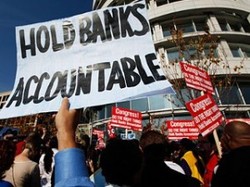VOICES: We need a new contract with Big Finance
 By Phil Mattera, Dirt Diggers Digest
By Phil Mattera, Dirt Diggers DigestA widely circulated rumor that Goldman Sachs executives were loadingup on firearms to protect themselves against a populist uprising turned outto be spurious, but the leaders of the bank are clearly worried aboutrising discontent over Goldman's prosperity amid continuing economicdistress for most everyone else.
The announcementthat Goldman's top 30 executives will be denied cash bonuses this yearis one of the most significant concessions Wall Street has ever made topublic outrage. The members of Goldman's management committee won't bedenied bonuses entirely but will receive them in the form of "shares atrisk" -- stock that cannot be sold for five years and is subject torecapture if the recipient engages in "materially improper riskanalysis" or fails "sufficiently to raise concerns about risks."
It is unclear whether these rules, which would require prudencerarely seen in the casino culture of investment banking, will beapplied stringently. Goldman's announcement that it will allow ashareholder advisory vote on compensation practices will make it a bitmore difficult to flout the rules entirely.
While the ultimate impact of the Goldman move is uncertain, Britainand France are putting a real and immediate dent in bloated banker payby imposing a 50 percent windfall tax on bonuses. Financiers in Londonand Paris are up in arms over the moves, with one investment bankingchief telling the Financial Times that as a result of the tax the "contract between government and business is broken."
And what exactly is that contract? As far as the financial sector isconcerned, the traditional contract was that banks were expected toprovide the capital needed for the "real" economy, and government didnot regulate the market too strictly. A decade ago, financiers got theregulatory regime loosened even more, which in the United States meantan end to the separation between commercial banking and investmentbanking. The new contract seemed to be that a fully liberated financialsector would magically create wealth to make up for the travails of theproductive portion of the economy.
The crisis of the past two years put an end to that notion, and thecontract we've been left with seems to be little more than anobligation by government to prop up a teetering financial sector withbailouts and access to virtually free funding. There is no quid pro quoimposed on bankers, who are allowed to deny credit to businesses andindividuals alike and use their cheap money to rack up trading profits.And those profits serve mainly to pay for outsized bonuses for thebankers themselves.
It's always been questionable whether big finance capital served alegitimate social purpose. Now it is clear that the big banks existmainly for the enrichment of their own executives. About half of total revenue at these banks is set aside for compensation of executives and other employees.
That's why Bank of America and Citigroup are so eager to repay theirbailout money and free themselves from the constraints of the federalpay czar. And it's why the big banks have felt no compunction aboutopposing the financial regulatory reforms now before Congress.
While financial industry lobbyists twist arms behind the scenes,Goldman is playing good cop with its bonus restrictions and the quasi-apologyits CEO Lloyd Blankfein issued in November. Yet neither voluntaryactions by the likes of Goldman nor modest regulatory reforms aresufficient. The current "contract" between big finance and not justgovernment but all of society needs to be rewritten, and this time weshouldn't let bank lawyers draft the document.
(Photo from Dirt Diggers Digest.)
